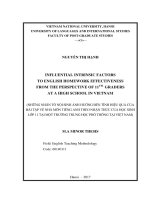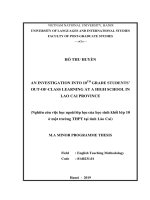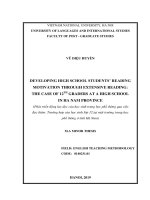Psychological factors affecting english speaking performance of 10th graders at a high school in nha trang
Bạn đang xem bản rút gọn của tài liệu. Xem và tải ngay bản đầy đủ của tài liệu tại đây (1.27 MB, 108 trang )
MINISTRY OF EDUCATION AND TRAINING
QUY NHON UNIVERSITY
NGUYEN TRAN THANH THUY
PSYCHOLOGICAL FACTORS AFFECTING
ENGLISH SPEAKING PERFORMANCE
OF 10TH GRADERS AT A HIGH SCHOOL
IN NHA TRANG
Field: Theory and Methodology of English Language Teaching
Code: 8140111
Supervisor: BUI THI ĐAO, Ph.D
BỘ GIÁO DỤC VÀ ĐÀO TẠO
TRƯỜNG ĐẠI HỌC QUY NHƠN
NGUYỄN TRẦN THANH THỦY
NHỮNG YẾU TỐ TÂM LÝ ẢNH HƯỞNG ĐẾN
KHẢ NĂNG NÓI TIẾNG ANH CỦA HỌC SINH
LỚP 10 TẠI MỘT TRƯỜNG TRUNG HỌC
Ở NHA TRANG
Ngành: Lý luận và phương pháp dạy học bộ môn tiếng Anh
Mã số: 8140111
Người hướng dẫn: TS. Bùi Thị Đào
i
STATEMENT OF AUTHORSHIP
I certify my authority over the submitted thesis, titled
PSYCHOLOGICAL FACTORS AFFECTING ENGLISH SPEAKING
PERFORMANCE OF 10TH GRADERS AT A HIGH SCHOOL
IN NHA TRANG
in fulfillment of the requirements for Master Degree.
Except when noted in the text, this thesis contains no material already
published elsewhere or extracted in whole or in part from a thesis for which I
have qualified for or been granted another degree or diploma.
No other person's work has been used without proper acknowledgement
in the thesis.
This thesis has not been submitted to any other educational institution
for the award of a degree or diploma.
Quy Nhon, 2023
Nguyễn Trần Thanh Thủy
ii
ACKNOWLEDGEMENTS
Firstly, I would like to thank my supervisor, Dr. Bùi Thị Đào, for
spending significant time offering me directions, guidance, constructive
comments, and encouragement. This thesis would not have been completed
without the invaluable assistance of my supervisor.
Secondly, I would like to thank my colleagues for their encouragement
and sharing of their thesis-writing experience.
Thirdly, I am appreciative to all of the students in my class who
participated in the study and provided me with valuable insight into the
research problem.
Finally, I also owe my special thanks to my family, who have always
expressed their warmest love to me. Without their encouragement and
support, this present paper would not have been completed in time.
iii
ABSTRACT
Regarding English language learning, speaking is recognized as a vital
skill that needs continuous development and enhancement to facilitate
effective communication. However, many students at Ly Tu Trong High
School in Nha Trang encounter difficulties in developing their speaking skills.
This research investigates the impact of psychological factors on the English-
speaking performance of 10th-grade students. The study uses mixed-methods
approaches combining surveys, interviews, and observations. The research
uncovers the significance of motivation, anxiety, confidence, shyness, fear of
making mistakes, and the learning environment. The participants taking part
in the survey questionnaire include 90 tenth grade students from Ly Tu Trong
high schools in Nha Trang. Semi-structured interviews were conducted with
the participation of five students and one teacher. The researcher observed 4
sessions in 2 classes. The study employs a quantitative research approach and
qualitative descriptive method. Data for the research was collected through
questionnaires, observations, and interviews. The findings of this research
provided insights into the specific psychological factors that significantly
impact students' speaking abilities. Many students voiced their hesitation to
speak English, primarily citing difficulties with pronunciation. The majority
of these students have openly admitted that they avoid using English in
conversation because they fear making errors. The results of this study can
contribute to the development of targeted interventions to improve English
speaking performance among 10th graders. The study also proposed a number
of implications, focusing on aiding the students to improve their speaking
performance.
iv
TABLE OF CONTENTS
STATEMENT OF AUTHORSHIP ................................................................... i
ACKNOWLEDGEMENTS .............................................................................. ii
ABSTRACT ..................................................................................................... iii
ABBREVIATIONS AND CONVENTIONS ................................................. vii
LIST OF TABLES ......................................................................................... viii
CHAPTER 1: INTRODUCTION ..................................................................... 1
1.1. Rationale ................................................................................................. 1
1.2. Aim and objective of the study ............................................................... 4
1.3. Research questions .................................................................................. 4
1.4. Scope of the study ................................................................................... 5
1.5. Method of the study ................................................................................ 5
1.6. Significance of the study......................................................................... 6
1.7. Organization of the study........................................................................ 6
CHAPTER 2: LITERATURE REVIEW .......................................................... 8
2.1. Definition of speaking skills ................................................................... 8
2.2. Psychological factors .............................................................................. 9
2.2.1. Lack of motivation .......................................................................... 11
2.2.2. Anxiety............................................................................................ 13
2.2.3. Lack of confidence.......................................................................... 14
2.2.4. Shyness ........................................................................................... 16
2.2.5. Fear of making mistake................................................................... 17
2.2.6. Performance condition .................................................................... 18
2.2.7. Learning environment.................................................................... 18
2.3. Speaking performance .......................................................................... 19
2.4. Aspects of speaking performance ......................................................... 19
2.4.1. Pronunciation .................................................................................. 20
2.4.2. Structural view ................................................................................ 20
v
2.4.3. Function view ................................................................................. 20
2.4.4. Fluency............................................................................................ 20
2.4.5. Relating forms to meanings ............................................................ 21
2.5. Types of speaking performance ............................................................ 21
2.5.1. Imitative .......................................................................................... 21
2.5.2. Intensive .......................................................................................... 21
2.5.3. Responsive ...................................................................................... 21
2.5.4. Interactive ....................................................................................... 22
2.5.5. Extensive (Monologue)................................................................... 22
2.6. The importance of teaching English speaking ...................................... 22
2.7. Review of previous studies ................................................................... 23
2.8. Summary ............................................................................................... 25
CHAPTER 3: RESEARCH METHODOLOGY ............................................ 27
3.1. Research design..................................................................................... 27
3.2. Participants............................................................................................ 28
3.3. Data collection instruments................................................................... 28
3.3.1. Questionnaire .................................................................................. 28
3.3.2. Interview ......................................................................................... 30
3.3.3. Observation ..................................................................................... 31
3.4. Data collection procedure ..................................................................... 32
3.5. Data analysis ......................................................................................... 32
3.5.1 Quantitative analysis........................................................................ 32
3.5.2 Qualitative analysis .......................................................................... 33
3.6. Summary ............................................................................................... 34
CHAPTER 4. FINDINGS AND DISCUSSION ............................................ 35
4.1. Research questions 1: What are psychological factors that influence
10th-grade students’ speaking skills? .......................................................... 35
4.1.1. Lack of motivation .......................................................................... 35
4.1.2. Anxiety............................................................................................ 39
4.1.3. Lack of confidence.......................................................................... 42
vi
4.1.4. Shyness ........................................................................................... 46
4.1.5. Fear of making mistake................................................................... 49
4.1.6. Performance condition .................................................................... 52
4.1.7. Learning environment..................................................................... 55
4.2. Research question 2: What solutions can be taken to enhance the
speaking performance of high school students? .......................................... 59
4.2.1 Results from teachers’ interviews.................................................... 59
4.2.2 Results from students’ interviews.................................................... 61
4.3. Discussion ............................................................................................. 63
4.4. Summary ............................................................................................... 63
CHAPTER 5. CONCLUSIONS AND RECOMMENDATIONS .................. 64
5.1. Conclusions ........................................................................................... 64
5.2. Recommendations ................................................................................. 65
5.2.1. Recommendations for educators..................................................... 65
5.2.2. Recommendations for teachers ....................................................... 66
5.2.3. Recommendations for students ....................................................... 67
5.3. Limitations of the research.................................................................... 67
5.4. Suggestions for further studies.............................................................. 68
REFERENCES................................................................................................ 70
APPENDICES
EFL vii
TESOL
ABBREVIATIONS AND CONVENTIONS
English as a foreign language
Teaching English to Speakers of Other Languages
viii
Table LIST OF TABLES Page
number number
Table 3.1 Title
30
Table 4.1 Description of the psychological factors used for the
Table 4.2 survey 36
Table 4.3 Students’ lack of motivation for English speaking 39
Table 4.4 performance 42
Table 4.5 Students’ anxiety on English speaking performance 46
49
Table 4.6 Students’ lack of confidence in English speaking 52
performance
Table 4.7 Students’ shyness on English speaking performance 56
Students’ fear of making mistake on English speaking
performance
Students’ Performance condition on English speaking
performance
Students’ learning environment on English speaking
performance
1
CHAPTER 1: INTRODUCTION
Chapter one presents the introduction of the study. This chapter
discusses seven parts, namely rationale, the aim and objective, the research
questions, the scope of the study, the method, the significance, and the outline
of the study.
1.1. Rationale
In today's globalized and modernized world, English skills have
become crucial for connecting individuals across various regions, cultures,
religions, and countries. Many individuals are required to possess good verbal
proficiency to interact smoothly in English. Hence, the main goal of English
language education should focus on equipping learners with the capacity to
communicate proficiently in English as revealed by Davies and Pearse (1998).
In simpler terms, the aim is to help learners successfully reach their
communication objectives.
In the process of teaching English, it has become evident that speaking,
out of the four language skills (listening, speaking, reading, and writing), is
the one most English learners are eager to acquire swiftly. Ur (1996)
underscores its paramount importance, asserting it as the key factor in
transforming learners into proficient English speakers. Consequently,
speaking serves not only as a mode of expression but also as a tool for
cognitive development and academic advancement (Goh, 2007). Moreover, it
stands as an essential component of effective communication (Shumin, 2002).
Anggryadi (2014) emphasizes the importance of this by stating that many
learners believe acquiring successful speaking abilities to be the primary goal
when studying English as a foreign language.
According to Fitriani (2015) and Leong (2017), the proficiency of
2
learners' speaking skills plays a significant role in the success of acquiring a
foreign language. Thus, language learners frequently encounter numerous
difficulties. To begin with, most students struggle with speaking fluently.
Then, they must use appropriate vocabulary for each and every situation.
Additionally, students must speak with proper grammar and, more
importantly, produce proper pronunciation and intonation when speaking
English. Hinkel (2005) claims that communication problems arise when
students encounter a word for which they do not know the meaning or form.
As a result, they are unsure of how and when to use the word and are
frequently interrupted while speaking.
In recent years, together with the increasing need for English learning,
great efforts in Vietnam and elsewhere have been made in order to improve
the quality of English teaching, especially, speaking skills. Based on my
extensive experience as an English teacher for several years, I've come to
realize that students frequently struggle with their speaking abilities. These
reasons could stem from the fact that English speaking classes are commonly
disregarded by teachers in favor of focusing on other areas of language
learning means such as grammar or vocabulary simply because high school
students' speaking skills were not examined for the last tests. On the other
hand, all of the participants have the trait of being frightened and unwilling to
communicate in English. Furthermore, due to a lack of speaking opportunities
at school, children's oral English abilities are lacking. Thus, how should we
account for this fact? This might be because they are, firstly, worried about
making mistakes fearful of criticism, or simply shy. Secondly, they have no
motivation to express themselves, as well as lacking confidence in expressing
their intended communicative goals.
Moreover, several experts emphasize that psycholinguistic factors have
3
a notably adverse impact on students' speaking endeavors. Ellis (2000)
mentioned that learners often discuss their practice, pinpointing issues and
exploring potential solutions. Haidra (2014) similarly asserted that
psychological factors not only yield negative effects but also complicate
students' English speaking proficiency. For instance, Putri (2014) conducted
research investigating the link between anxiety, a psycholinguistic factor, and
students' speaking performance. Notably, they found a significant positive
correlation between low anxiety scores and enhanced speaking performance.
These psycholinguistic aspects influence students' oral competence and
contribute to the creation of obstacles that limit their ability to communicate.
Even though English learners, especially Vietnamese high school
students, understand how important speaking skills are, they still struggle to
speak or express themselves in English. In fact, a lot of high school students
often find it hard to speak confidently. Some students even get so frustrated
that they cry or can't say anything during speaking performance. This is a big
problem for high school students in Ly Tu Trong high school too.
However, those studies only pay attention to certain components or
groupings of characteristics that have an impact on learners' oral performance
singly or collectively under different conditions. As a result, there is a lack of
study on the variables influencing speaking performance for high school
students in Vietnam, particularly in Nha Trang areas where English is now
increasingly being used by students. Due to this, the writer has conducted a
title on "Psychological factors affecting English speaking performance of 10th
graders at a high school in Nha Trang" in an effort to gain insights into the
specific psychological dynamics that may affect the English speaking
performance of 10th graders at Ly Tu Trong high school in Nha Trang and,
4
then to identify the most effective teaching strategies to enhance high school
students' English speaking abilities generally.
Moreover, conducting this research in a specific geographical location
such as Nha Trang allows for a localized understanding of the factors such as
cultural influences, educational policies, and the language learning
environment in Nha Trang may have unique characteristics that impact
students' psychological well-being and English speaking performance. By
focusing on this specific context, the research can provide insights that are
relevant and applicable to the local educational system and contribute to the
improvement of English language education in the area.
1.2. Aim and objective of the study
The aim of this study is firstly to investigate how psychological factors
impact the English speaking performance of 10th-grade students by exploring
the interplay of motivation, anxiety, confidence, shyness, fear of making
mistakes, the performance condition, the learning environment, and then, to
some extents, to offer some solutions in order to improve students’ English
speaking ability and speaking performance.
To fulfill these aims, the specific objectives of the study include:
- To evaluate how psychological factors impact students' proficiency
in English speaking.
- To provide potential remedies for enhancing students’ English
speaking abilities.
1.3. Research questions
In order to reach the above aims and specific objectives, the research is
expected to answer the following questions:
1. What are psychological factors that influence students’ Engllish
5
speaking skills?
2. What solutions can be taken to enhance the speaking performance of
students?
1.4. Scope of the study
The study was carried out with participation of 90 tenth grade students
from 2 classes 10C1, 10C2 of Ly Tu Trong High School. The study was based
on the survey questionnaires and interviews with the students and teacher.
The researcher did not analyze factors affecting all aspects of speaking skill
but only focuses on psychological factors including ANXIETY, SHYNESS, LACK
OF CONFIDENCE, LACK OF MOTIVATION, FEAR OF MAKING MISTAKE, LEARNING
ENVIRONMENT, AND PERFORMANCE CONDITIONS based on the theories
revealed by Rao et.al. (2019), Ghebard (2000) and Brown (2004). This is a
descriptive study with three main instruments including the questionnaire,
interview and observation.
1.5. Method of the study
The current research was designed as a descriptive study using both
quantitative and qualitative methods to find the answers for the research
questions. Data was collected through a set of the survey questionnaire which
was delivered to 90 tenth grade students. Additionally, to augment the survey
questionnaire findings and enhance the study's reliability, informal interviews
were conducted with 5 out of 90 students and one teacher from Ly Tu Trong
High School to gather additional information. Subsequently, classroom
observations were conducted to illuminate the complex relationship between
psychological factors and English speaking performance among tenth-grade
students. Ultimately, drawing from the outcomes of the study, comments,
recommendations, and conclusions were presented.
6
1.6. Significance of the study
In terms of theory, this research can supply valuable insighs into the
psychological fators affecting students’ English speaking performance. The
findings of the study might be also utilized as a starting point for additional
research on relevant topics. By doing this study, the researcher hopes that
students will assess their own speaking performance after gaining an
understanding of their English proficiency and the factors that influence it.
This self-evaluation will guide their efforts to enhance their English speaking
abilities; if they perceive their skills to be lower than those of their peers, they
will engage in more frequent practice. Understanding the elements that
influence students' English speaking performance allows teachers to
implement more effective English learning practices, resulting in higher
student outcomes. The school can develop targeted solutions, such as a new
English program, to address performance factors affecting students' English
speaking skills.
1.7. Organization of the study
The study consists of five chapters:
Chapter 1 – Introduction – presents rationale, aim, objectives, the
research questions, the scope, significance and organization of the study.
Chapter 2 – Literature review – presents the concepts relevant to the
speaking skills, psychological factors, speaking performance, aspect of
speaking performance, types of speaking performance, teaching speaking, the
importance of speaking competence and previous studies.
Chapter 3 – Methodology – presents the research design, participants,
data collection instruments, data collection procedures, and data analysis of
the research.
7
Chapter 4 – Findings and discussion – analyses and discusses the
data and the lists of major findings of the study.
Chapter 5 – Conclusions and recommendations – is a review of the
study, and points out implications for the improvement, its limitations and
suggestions for future research.
The final section of the thesis contains the appendices that display all
documents related to or used in the study.
8
CHAPTER 2: LITERATURE REVIEW
Chapter 2, Literature Review, is composed of eight sub-sections. The
first five sections presents the concepts relevant to the speaking skills,
psychological factors, speaking performance, aspect of speaking performance,
types of speaking performance. The sixth and seventh sections present
theories on teaching speaking and emphasize the significance of speaking
proficiency, while the final section summarizes previous studies.
2.1. Definition of speaking skills
Speaking is defined as a two-way process that includes true
communication of opinions, information, or emotions by Eckard and Kearny
(1981), Florez (1999), Howarth (2001). This top-down perspective sees
spoken texts as the collaboration of two or more people in a shared time and
context. According to Bygate (1987), speaking is the act of producing
auditory signals that cause listeners to respond verbally in a number of ways.
It is thought to systematically combine sounds to form meaningful sentences.
Drawing from these aforementioned theories, it can be inferred that speaking
constitutes an active and productive skill utilized for expressing ideas through
spoken language. Speaking is a skill frequently employed in everyday
interactions between individuals to convey ideas, emotions, or thoughts.
According to Nunan (1995), speaking skill is the ability to pronounce a
word orally, communicate and interact with other people using spoken
language, and accomplish a variety of communicative goals such as making a
speech or making a request. Brown (2001, p. 9) states that speaking “isn't a
singular skill; instead, it's an interactive procedure where meaning is
constructed through the generation, reception, and comprehension of
information.” Furthermore, Harmer (2001, p. 15) highlights that speaking
9
encompasses two essential aspects: accuracy and fluency. In essence,
cultivating speaking proficiency involves not only employing vocabulary,
grammar, and pronunciation correctly but also being capable of spontaneous
and fluent speech.
According to Spratt, Pulverness, and Williams (2005, p.34), speaking is
“a skill involving using the speech organs to convey meanings to others, akin
to writing. It's a crucial skill because it serves as a bridge connecting
individuals who share the same language.” This ability enables people to
communicate thoughts, ideas, emotions, and feelings to one another. EI-Basel
(2008, p. 74) emphasizes that speaking skills “are essential for personal
success. These skills encompass a broad spectrum, ranging from casual
conversations to formal public speaking.” Richards (2009, p. 19) states that
“in speaking we tend to be getting something done, exploring ideas, working
out some aspects of the world, or simply being together.”
Dorgham (2011, p. 1) claims that “speaking abilities play a key role in
the communication process and are integral to daily life and learning
developing speaking skills facilitates effective connections within society.”
Iqbal (2012) defines speaking as the oral mode of communication that is more
difficult and complex than the other three language skills (Listening, Reading,
and Writing). He emphasizes that speaking is more than just making sounds
out of words; it is also about combining them to form meaningful messages.
2.2. Psychological factors
According to Ellis (2003, p. 1), psycholinguistics is “the study of the
mental processes and structures involved in language acquisition and use.
Cognitive processes that result in logical and grammatically sound sentences
are part of psychological considerations.” As part of this, expressions, words,
10
and text are formed as well as grammatical structures used. In addition, the
study of the neural mechanisms underlying language learning and usage is a
key component of the scientific subject of psycholinguistics.
Brown (2001) stated that there are numerous elements that influence
learners during the process of learning and using an EFL, making it
challenging for them to succeed in using English. No successful cognitive or
affective action can be carried out unless there is some degree of self-
confidence, knowledge of oneself, and belief in one's own talents for that task.
Self-confidence is a measure of how much a person believes in and trusts
themselves. Some students with great self-confidence may give good
evaluations of themselves during the observation classroom exercise, which
supports their language acquisition. Because of their lack of confidence,
pupils who struggle with speaking English or feel less inclined to do so.
Minghe and Yuan (2013) suggested that English students often struggle
with speaking fluently due to their fear of making errors. As a result, some
students refrain from participating in English discussions due to vocabulary
issues and this fear, leading to an inability to speak English proficiently.
Speaking in English becomes a source of stress for students, particularly when
they need to perform tasks using the language. This highlights the
significance of psychological factors in students' speaking performance
success.
It is clear that psychological factors play a significant role in language
acquisition, particularly in the speaking domain, and that they have a
significant influence as revealed by Harmer (2007, p. 345) i.e. “shy persons
are less likely to express themselves in front of others, therefore when asked
for personal information or thoughts, students are frequently reluctant to talk.”
Another common concern is the fear of making a fool of oneself in front of a









